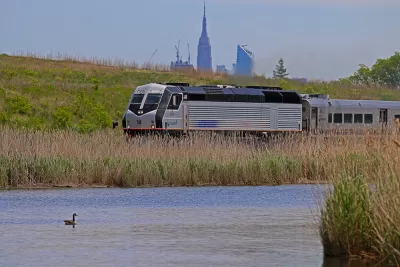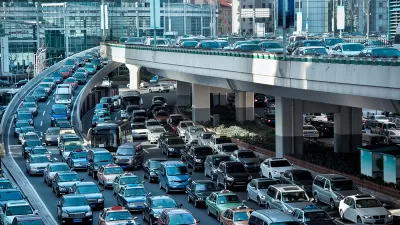Shifting commute patterns and the popularity of remote work could pose an existential threat to the New York City region's commuter rail services.

As reported by Matthew Haag and Patrick McGeehan, New York City's commuter rail services are continuing to experience drastically reduced ridership as the five-day office workweek seems increasingly obsolete. "In 2019, the regional transit agencies collectively carried more than 500 million passengers across the New York area, but ridership in 2021 declined by more than half of that prepandemic level." According to the MTA, the agency collected only $49 million in fares in 2021, down from $346 million in 2019.
The authors note that sales of monthly passes on commuter rail are down by 75 percent, leading to a dramatic drop in revenue despite optimistic projections from transit agencies. "Even as transit officials insist that the commuter railroads will start bouncing back in notable numbers this year, the agency is also acknowledging that the pandemic is more and more likely to lead to permanent changes in the region’s commuting pattern."
The agency has approved discounted passes to incentivize riders, but many former commuters show little interest in returning to hours-long commutes and passes that cost upward of $300. The article quotes Phil Pescatore, chief ethics officer at Guardian Life Insurance Company of America, who used to commute into the city from New Jersey. "'It’s been found time, and I have repurposed that time,' Mr. Pescatore said. 'I do things that I hadn’t had a chance to do: a bit more exercise in the morning, and the ability to think and plan a little bit more.'"
FULL STORY: How Remote Work Is Devastating New York City’s Commuter Rails

Alabama: Trump Terminates Settlements for Black Communities Harmed By Raw Sewage
Trump deemed the landmark civil rights agreement “illegal DEI and environmental justice policy.”

Planetizen Federal Action Tracker
A weekly monitor of how Trump’s orders and actions are impacting planners and planning in America.

Why Should We Subsidize Public Transportation?
Many public transit agencies face financial stress due to rising costs, declining fare revenue, and declining subsidies. Transit advocates must provide a strong business case for increasing public transit funding.

Understanding Road Diets
An explainer from Momentum highlights the advantages of reducing vehicle lanes in favor of more bike, transit, and pedestrian infrastructure.

New California Law Regulates Warehouse Pollution
A new law tightens building and emissions regulations for large distribution warehouses to mitigate air pollution and traffic in surrounding communities.

Phoenix Announces Opening Date for Light Rail Extension
The South Central extension will connect South Phoenix to downtown and other major hubs starting on June 7.
Urban Design for Planners 1: Software Tools
This six-course series explores essential urban design concepts using open source software and equips planners with the tools they need to participate fully in the urban design process.
Planning for Universal Design
Learn the tools for implementing Universal Design in planning regulations.
Caltrans
Smith Gee Studio
Institute for Housing and Urban Development Studies (IHS)
City of Grandview
Harvard GSD Executive Education
Toledo-Lucas County Plan Commissions
Salt Lake City
NYU Wagner Graduate School of Public Service




























